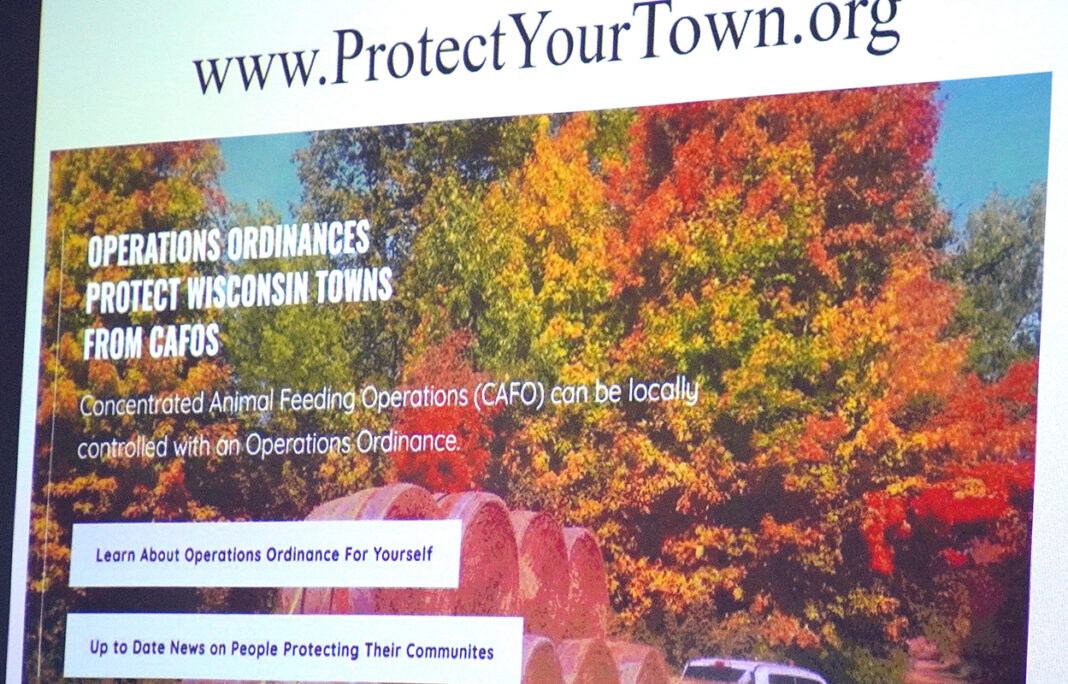Submitted by Maiden Rock Operations Ordinance Study Committee
TOWN of MAIDEN ROCK, WI – On Monday, December 9, 2024, the Maiden Rock Town Board voted unanimously to pass an ordinance that will require industrial factory farms in the town to submit plans on how they will address community concerns.
The Town of Maiden Rock became the first in Pierce County to pass local legislation overseeing and providing some checks for large corporate livestock operations expanding across Wisconsin. Following nine months of research and a public hearing in November that drew nearly 100 people to learn about a proposed ordinance for CAFOs (Concentrated Animal Feeding Operations), the Maiden Rock Town Board has voted unanimously to pass the ordinance similar to others seen in Polk and Burnett Counties.
Starting in March, an ad-hoc study commission was formed by the Town, with seven members serving. Participation was open to any township resident. A former volunteer firefighter, a long-serving Town Supervisor, and others with family farm backgrounds participated. Through this study process, 18 Public meetings were held. One such meeting included a site visit at Ridge Breeze Dairy, during which the commission took a tour of the facility and had an in-depth question-and-answer session.
The committee also heard stories and experiences of people in Pierce County and beyond who have experienced the effects of living near a CAFO.
“I’ve heard horror stories from friends who live close to two such CAFO operations in the County: 13 days straight of tanker after tanker full of liquid manure driving recklessly past their homes at all hours this fall, ash from incinerated animals falling on their lawns like snow!”, reports Judy Krohn, a member of the Study Commission. “This past Spring, Town Board members and I both observed–firsthand– damage to narrow town roads from two days of tankers hauling waste to spread on fields surrounding the Town Hall. There would have been no way a large emergency vehicle could have passed through this area with the line-up of trucks blocking the way. A day or two after they finished, we had a 3-inch rain event, and that manure washed right off the field into a known marshy area nearby.”
The commission studied the effects of industrial agriculture in rural areas and considered their options to protect local water, roads, and neighbors. The Operations Ordinance the commission recommended will serve as a way for the Town to work with CAFOs to create plans on how they will address various impacts and risks of their operations on local resources and infrastructure. Some of these aspects are currently completely unregulated by the county or the state. The ordinance asks that plans be submitted to explain how a CAFO intends to address air pollution, water usage, manure spreading, road damage, carcass disposal, biosecurity, and fire protection. CAFOs pay the costs for the Town to use experts to review and enforce the plans.
Despite distortion and misrepresentation from industry interest groups, farming communities across the state have passed similar legislation to create a process for CAFOs to work with local communities. The ordinance only applies to factory farms spreading manure in the town with at least 1,000 animal units – more than 55,000 turkeys, 125,000 chickens, 2,500 hogs, 700 dairy cows or 1,000 cattle. Authority to pass local ordinances is granted through WI Stat § 61.34, among other statutes. The ordinance is backed up by pages of local and general findings of fact that show the possible negative effects of industrial agriculture.
With the passage of this ordinance, the Town of Maiden Rock joins several other towns and counties across the state that have used the Operations Ordinance as a way to protect their town and surrounding communities.
“The decision by the Maiden Rock Town Board is a result of the community banding together and sharing their stories and fears. We’ve heard it all. Landowners have had their land used for manure spreading without permission. Residents have had to call the Sheriff’s Department to escort them out of their own driveway due to heavy truck traffic on country roads.
Families have had to live with poisoned water that causes sickness and cancer. It’s a win for everyone who has shared their stories, and I hope to see other towns follow suit with ordinances of their own. Ordinances like this will help restore rural Wisconsin to a place where our small towns are thriving again,” stated Danny Akenson, Field Organizer, GROWW (GrassRoots Organizing Western Wisconsin).






